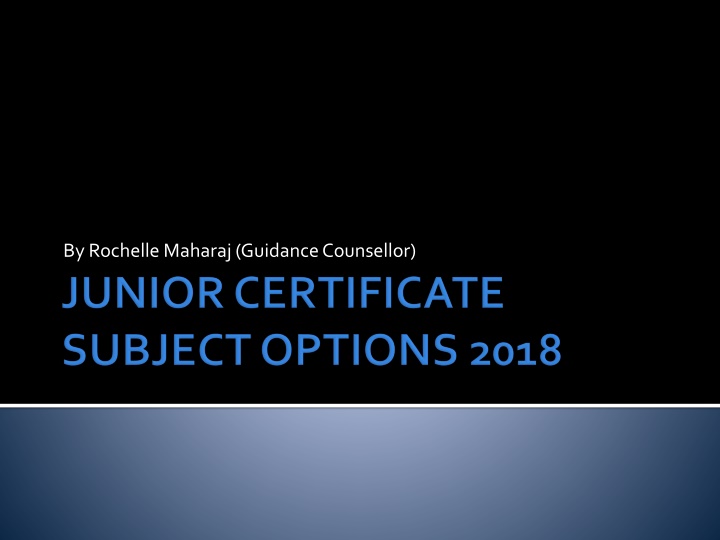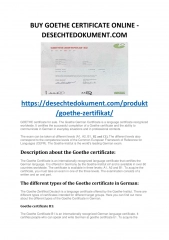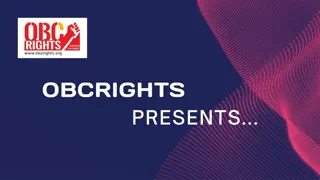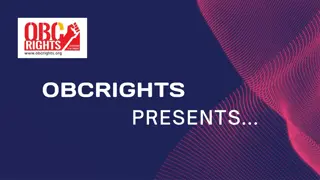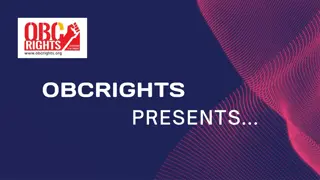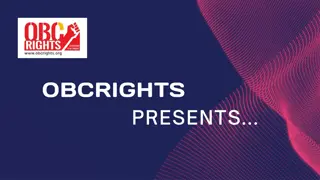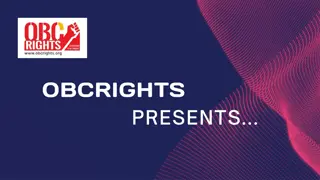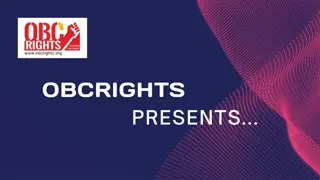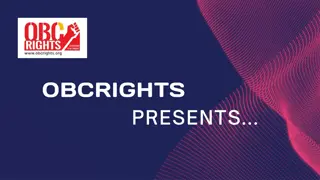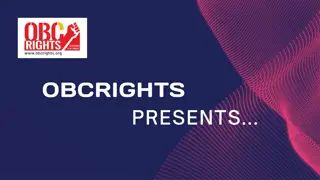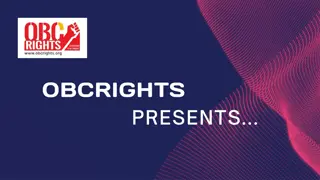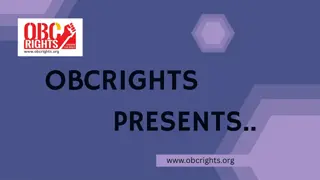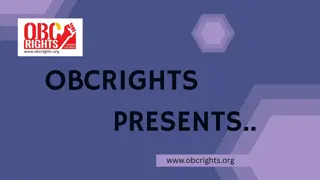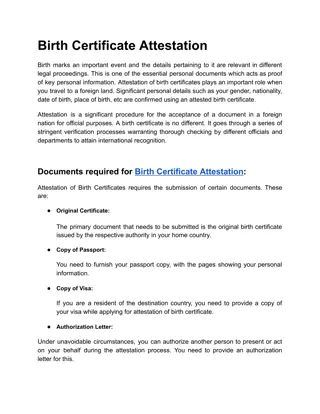Choosing Subjects Wisely for Junior Certificate Success
Students must carefully select subjects for their Leaving Certificate to shape their future career. Keeping options open by choosing a variety of subjects, focusing on personal strengths and interests, and avoiding influence from others is crucial. The new Junior Cycle emphasizes assessment through a dual approach that supports student learning over three years. Specific subjects will be assessed at different levels, with core examination subjects including Irish, English, Maths, and Science.
Download Presentation

Please find below an Image/Link to download the presentation.
The content on the website is provided AS IS for your information and personal use only. It may not be sold, licensed, or shared on other websites without obtaining consent from the author.If you encounter any issues during the download, it is possible that the publisher has removed the file from their server.
You are allowed to download the files provided on this website for personal or commercial use, subject to the condition that they are used lawfully. All files are the property of their respective owners.
The content on the website is provided AS IS for your information and personal use only. It may not be sold, licensed, or shared on other websites without obtaining consent from the author.
E N D
Presentation Transcript
Students must pick subjects carefully as it will determine their Leaving Certificate options and perhaps even their career choice in later years.
Keep all your options open. Pick a range of subjects from different subject groupings. Pick subjects that you are good at, subjects you enjoy most and will work well in. Remember that there are NO EASY OR HARD subjects-ALL subjects require hard work, study and commitment in order to succeed. Every subject becomes more difficult in second year-as there is a lot more work involved.
Pick the subject not the teacher Don t chose a subject just because your older brother or sister did well in it. Don t follow friends Amount of work or homework you think is involved in the subject. Picking subjects without any thought All subjects with a strong project element
The most significant change in the new Junior Cycle is in the area of assessment A dual approach to assessment that supports student learning over the three years of junior cycle and also measures achievement at the end of those three years. This dual approach reduces the focus on one externally assessed examination as a means of assessing students It increases the prominence given to classroom- based assessment (CBA s)
Subjects below will be assessed under the new Junior Cert Specifications- English, Irish and Maths-will be assessed at Higher or Ordinary level Art, Business, French, Geography, History Home Economics, Music, Science all assessed at a common level- Usually a 2-2.5hr final exam and have 2 CBA s in 2nd& 3rdYear
4 Core Examination Subjects Irish (unless Exempt) English Maths Science
Non Examination Subjects Religion Wellbeing (PE,SPHE, CSPE)
5 Optional Subjects: Choose from Art Business Studies French Geography History Home Economics Material Technology (Metalwork) Material Technology (Woodwork) Music Technical Graphics
Language Group Irish, English, French Science Group Mathematics, Science. Business Studies Group Business Social Studies Group History, Geography, Art, Music, Home Economics Practical Group Materials Technology (Wood),Materials Technology (Metal), Technical Graphics
English: A Pass is required for most courses; sometimes Irish will be accepted instead Junior Cert Reform- 10% based on Classroom Based Assessment (CBA) in 2ndand 3rd yr Irish-requirement for entry to the University and IT s. Classroom Based Assessment in 2ndand 3rd yr Also a requirement for the Cadets. Gardai require two languages. H5 (50-60%) Higher Level required for primary teaching or study Irish at Trinity College
At present a third or a foreign language (French) is required for the majority of programmes at- N.U.I. Galway, Maynooth, UCC, UCD, the National College of Surgeons as well as some Colleges linked to them such as St. Angela s, Sligo; Shannon School of Management; N.C.D.A and Army Cadetships and the Air Corps. Often it is too early for students to drop their foreign language before the JC Students exempt from Irish and receiving resource will find French difficult CBA in 2nd & 3rd Yr One Common level final exam 2hrs duration
Nursing courses in any of the Colleges mentioned above, Agricultural Science, General Science and Engineering courses at N.U.I Galway ,Maynooth, UCD and UCC. It is important to remember that there are many colleges such as U.L and DCU and the Institutes of Technology that DO NOT require a third language for entry.
This subject is concerned with understanding the environment in which business operates, the business environment both the public and private sectors. The course of study through the three inter-connected strands: Personal Finance ,Enterprise andOur Economy . 2 Classroom based Assessments (CBA s) in 2ndand 3rdyear. Final Exam-Common Level-2 Hrs duration
Biology, Chemistry, Physics are covered at Junior Certificate. Science is compulsory at JC Science is required for anything in the Engineering, Medical, Paramedical, Science and Nursing fields. 2 Classroom based Assessments (CBA s) in 2nd and 3rdyear. Final Exam- Common Level- 2 Hrs duration
Art Geography History Home Economics Music
Many of the skills you learn while studying Art are very useful outside of school and in whatever job you choose to do in the future. There are many career opportunities -areas such as: photography, illustration, interior/industrial/fashion design, education and architecture. 2 Classroom-BasedAssessments , For the SEC- students will reflect on and use the feedback from their teacher and peers, as the basis to create further significant developmental work in their Visual Art sketchpad as well as two realised pieces for the examination.
It is the study of places, people and what shapes the environment Geography prepares you for careers in town planning, outdoor pursuits education, weather forecasting, tourism and transport. Geography keeps you informed of topics which arise in conversation, current affairs, newspaper reports, and on TV, such as climate change, renewable energy and aid to poorer nations. 2 CBA s Geography in the news and My Geography in 2nd& 3rd Yr 1 Common level exam 2 hrs in duration
History involves the study of people who lived in the past -ordinary people as well as famous people- using sources and other evidence. History can help you in may different careers, especially those linked with heritage, tourism, research and the environment. 2 CBA s The Past in my place and A life in Time in 2nd& 3rd Yr Finding out about important changes that, over time, have helped to shape the world in which we live. 1 Common level exam 2 hrs in duration
Literacy is a bridge from misery to hope. It is, the road to human progress and the means through which every man, woman and child can realise his or her full potential. Kofi Annan -United Nations General Secretary
Home Economics is a subject where you will learn how to take care of yourself, others, your home and your environment. As Home Economics is a very practical subject, you will carry out a lot of activities in school and at home. Students will sit a written examination of one and a half hour's duration Practical Exam 2 Classroom based assessments in 2nd& 3rd Yr -Creative textiles and Food literacy skills brief
In JC Music, you will sing and learn how to play an instrument. You will listen to many types of music such as pop, classical and traditional Irish music. You will also start composing. 2 CBAs-Composition portfolio and a programme note Practical (30%)and written exam(70%) Possible careers in music: education (teacher, lecturer), business (sound engineer, lyricist, reviewer, therapist) and performance (composer, performer, conductor).
Materials Technology (Wood) Material Technology (Metalwork) Technical Graphics
In MTW you will learn to design small projects and the skills required to use tools and equipment to make your designs. You will work mainly with wood but also with the materials. You will learn about wood as a material and how it is produced. Course work Project (66%)and Written Exam
It is an activity-based course focusing on metal, how to work with it and how to assemble different parts. Other materials such as plastics and wood are also Investigated and used in project work. You will be working with basic electronic components too. Course work Project, Written Exam and Practical exam (Higher level)
In Technical Graphics you will learn how to represent 3-D objects on paper and on computer. You will develop problem solving and creative thinking skills through the solution of graphical problems. This subject will be of use to you if you want to progress into career areas such as architecture or engineering.
CODING DIGITAL MEDIA LITERACY The short course aims to develop the student's ability to formulate problems logically; to design, write and test code through the development of programs, apps, games, animations or websites; and, through their chosen learning activities, to learn about computer science. This short course aims to extend and refine students ability to use digital technology, communication tools, and the internet creatively, critically and safely, in support of their development, learning and capacity to participate effectively in social and community life.
Homework is re-enforcing schoolwork Do homework both oral, written and research consistently Study-revision-learning-re: learning 2nd Year student-2 hours study per night Most Subjects have CBA-Attendance and steady work in class is a must Learning takes place in the classroom Be organised with books and equipment
Think carefully before you choose your subjects It may be difficult to change subjects once chosen Every subject requires hard work and study- 3rd language French not necessary for all Colleges. Practical subjects have projects-outside of class time Difficult to do a subject for LC if not taken for JC
While every effort will be made to facilitate your son/daughter with their 5 highest preference subjects, this may not always be possible due to subject combinations and timetabling restraints Useful website: www.careersportal.ie For the new Junior Cert Specifications: https://www.curriculumonline.ie/Junior- cycle/Junior-Cycle-Subjects
